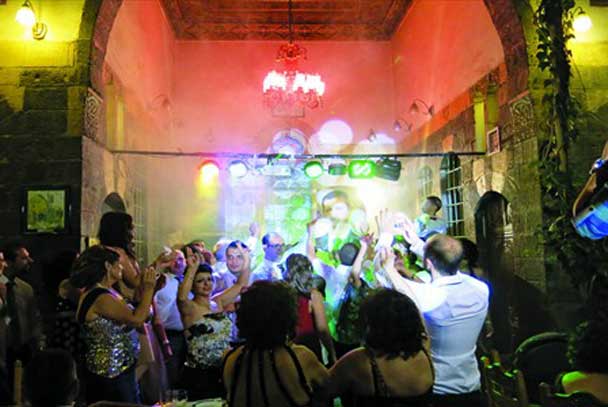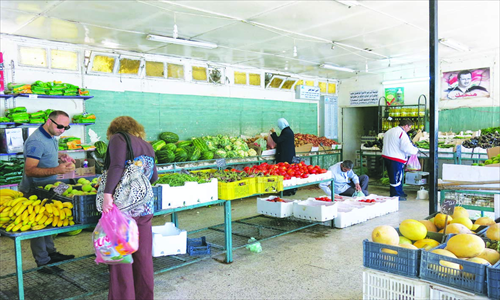Damascus perseveres under shadow of war

A wedding banquet for a Christian couple is held at a restaurant in Syria's capital Damascus on Sunday night. Photo: Yang Jingjie/GT

A fruit vendor in Damascus Photo: Yang Jingjie/GT
As darkness fell in Damascus, the exchange of bombardments and mortar shells between government forces and rebels stepped up on the outskirts of the capital.
Inside the Old City, residents and visitors wandered through the historic heart of Damascus, packed with monuments, religious sites and craft shops. People smoking hookahs could be seen at every restaurant and coffee shop, despite the constant thundering several kilometers away.
At one restaurant in a Christian neighborhood of the Old City, joyful cheers and music played as a wedding party drowned out the sounds of artillery.
The party took place only one day after US President Barack Obama announced Saturday that he would seek congressional support for a military strike against Syria for the alleged gas attack in suburban Damascus August 21 by the Syrian regime, dispersing fears of an imminent attack that almost emptied Damascus' streets for two days.
Guests at the wedding party sang and danced to the song "Viva Syria," with one of them holding a poster of Syrian President Bashar al-Assad.
"May God bless the Syrian army and President Assad," toasted the bride's father, followed by cheers from the guests.
Such scenes are a regular sight in nearly every party in the regime's stronghold regions after two-and-a-half years of a civil war, which the UN says has killed 100,000 people.
Under the cloud of a US-led strike and fierce fighting, hundreds of thousands of families are coping with the various miseries brought about by the conflict.
"We are a little bit scared, but we're not canceling anything," Rouba, a friend of the bride who only gave her first name out of security concerns, told the Global Times.
Economic ravages
The civil war that has raged since March 2011 has brought inflation of more than 40 percent, causing a huge devaluation of the country's currency.
On the black market, the exchange rate for the Syrian pound to the US dollar now stands at 200:1, compared to 70:1 in late 2011. Meanwhile, prices for commodities have more than tripled.
Alfred, a 20-year-old economics student at Damascus University, told the Global Times that his parents, who are government employees, could save some money before the crisis, but now they "spend everything" due to rocketing prices.
"I used to go to restaurants every day, but I now only go twice a week," he added.
The soaring living costs have broken many families apart. The Lebanon-based As-Safir paper in July cited records kept by the Syrian Ministry of Justice as saying that "divorce cases have risen by 45 percent in Syria last year, while marriages have decreased by 40 percent."
The newlyweds, George and Christina, however, decided to tie the knot anyway during the time of crisis.
According to Alfred and Rouba, the new couple and the bride's mother were caught in the rebel shelling of a business district neighboring the Old City a week before the wedding, but fortunately only suffered minor injuries.
When looking at the capital from the hilltop of Gasyon, the highest point of the city, Damascus is shrouded by a layer of black smoke as a result of repeated artillery fire between government forces and rebels.
The opposition has been prevented from setting foot into the city by the army, but keeps firing rockets into the capital and planting bombs.
In response, the regime has stepped up its own bombardments, set up numerous checkpoints, and erected concrete barriers painted with the national flag of Syria at all major crossroads and outside key buildings.
The Old City, which is on the UNESCO World Heritage List, has been struck many times by rebels, including a suicide bombing in June that killed at least four people. Inside the ancient site, a crater made by a recent strike can still be seen.
"You can't find anybody in Syria who doesn't know somebody died [during the crisis]," Alfred said, adding that one of his friends died just before his wedding and another had her house destroyed by shelling.
"Everybody is afraid of dying, but we are ready to die," said Alfred.
Struggling to live
Despite the many deaths caused by the war and a potential US strike, residents in the city have sought to keep on going.
Most supermarkets, restaurants and cinemas in Damascus are still operating as usual, and stockpiles of commodities at stores seem abundant.
At a State-owned food market in downtown Damascus, Faten Ali, a stay-at-home mom who used to be an English teacher, told the Global Times that life goes on, adding that "We Syrian people are very strong, and we are never, never afraid," not even of a US military strike.
From dawn to dusk, many people, including parents with their children, frequent parks downtown, regarded as a safe zone in Damascus.
After finishing their shifts, some armed security personnel, who were on full alert during the day, sat together on the curb with a drink to enjoy the cool night air, their guns placed beside them. They even invited foreign visitors to join them.
However, the cruelty of war has taken away much of the normal life of Syrians.
"We used to hold parties all night, but now they must finish in the evening," Rouba said, also noting that it is no longer safe for guests to travel long distances, especially to villages contended by the army and rebels.
"You cannot trust anybody," warned Alfred, saying there are too many "betrayals." He cited the story of two brothers who killed each other for being on various sides of the conflict.
Rouba said one of her friends joined the rebels for money and told her to leave the country a year ago. "He said many things to scare me, such as Syria is going to burn, and many people will come to kill me or rape me because I'm Christian," she said.
Christians in Syria make up about 10 percent of the population, while the Alawites, a sect from which the Assad family has emerged, account for some 12 percent and the Sunnis account for the majority with 70 percent.
Following the crisis, most Christians have thrown their support behind Assad, as a number of the rebels are linked with extremist groups like Al Qaeda, who it is feared would persecute Christians if they took over.
Both Rouba and Alfred said they are not 100 percent happy with the regime, especially due to low wages, but were absolute in their support of the government. "I support the president, because he protects us," said Rouba.
Lovers parted
The conflict has also forced millions to leave Syria.
According to UN figures released on Tuesday, more than 2 million Syrians have poured into neighboring countries like Lebanon, Jordan and Turkey as refugees.
Meanwhile, many richer folk have left their war-ravaged country in anticipation of a worsening situation, and those with less money have sold their houses to send their children out of Syria.
The crisis has also led to couples being separated.
Rouba's fiancé, who she has been dating for seven years, left Syria for Lebanon in April under pressure from his family, who wanted him to avoid being drafted into the military.
In Syria, men are obliged to serve 18 months of compulsory military service. The military service can be exempted if the person lives overseas. After four years of deferment abroad and a payment of $15,000, he can buy his way out of the service.
Following growing US rhetoric against Syria, Rouba's fiancé, who is from a rich family, wanted to return to fight against a potential US invasion. However, his mother took his ID away to prevent him from returning.
Asked whether she would like to go abroad with her fiancé, Rouba replied that her family has the money to leave but refuses to do so.
"I'd rather die in Syria, because I love the country and would love to spend all my life in Syria," she said.
Despite the many obstacles facing them, the relationship between the pair is still on.
The 24-year-old girl said she loves her fiancé and would wait for him for four years. When asked about her dream, Rouba beamed, saying "I want to marry my fiancé and have five kids." It seemed the war was unlikely to deter Rouba, at least.